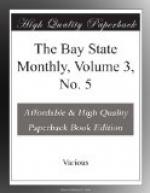Being made to sit as presiding officer over the senate, to listen for four years to debates more or less stupid, in which I can take no part or say a word, nor even be allowed a vote upon any subject which concerns the welfare of the country, except when my enemies might think my vote would injure me in the estimation of the people, and therefore, by some parliamentary trick, make a tie on such question, so I should be compelled to vote; and then, at the end of four years (as nowadays no Vice President is ever elected President), and because of the dignity of the position I had held, not to be permitted to go on with my profession, and therefore with nothing left for me to do save to ornament my lot in the cemetery tastefully, and get into it gracefully and respectably, as a Vice President should do.
The Record asserts that, “this is about as near the truth as Butler ever gets,” and then goes on to make some additional statements which, to say the least, are exceedingly interesting, and proofs of which the Editor’s Table respectfully requests.
The Record says; “It is true that his (Butler’s) name was proposed for the nomination for Vice President in 1864.”
Upon whose authority does this assertion rest, and by whom was General Butler’s name thus proposed?
The Record says:—“It is also true that he (Butler) heard of it, and objected to the plan not for the reasons he now gives, but because he ‘didn’t want to run on the ticket with Abe Lincoln.’"
Intensely interesting this, an important fact it would seem for the future historian. But,—will the Record please quote its authority?
The Record says:—“That this was the ground for his (Butler’s) refusal to take the nomination, in case it should be offered to him, was well known to those who were informed of the exact state of affairs at the time.”
The historian is still incredulous. All this “was well known to those who were informed,” etc.,—undoubtedly, but who were these persons? Will the Record cite the name of one living man thus informed? Did General George A. Gordon know anything about it: and if not, why not?
The Record says:—“Butler, in the last days of the war, uttered an insult to the President who was shortly to be made a martyr.”
Well, this is really a serious charge, and the public certainly will be interested in knowing what the “insult” was. Will the Record kindly explain? For the present, the subject may rest here. In the name of truth and justice, however, the Editor’s Table humbly requests that the Evening Record will enlighten its contemporaries.
* * * * *




